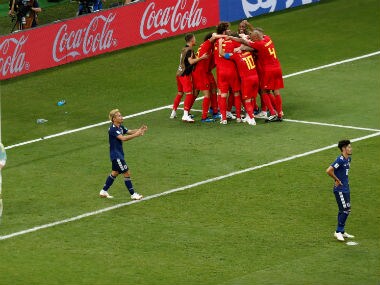FIFA World Cup 2018: Late goals in Russia a trend rather than an aberration as the tactical superiority of big teams go for a toss.

Belgium's Nacer Chadli celebrates scoring the team's third goal in the stoppage time against Japan. Reuters
‘South Korea send defending champions Germany packing’, ‘Russia eliminate Spain in a game of penalties’, ‘Japan scare Belgium in a pulsating thriller’ – the headlines originating from Russia this summer has prompted many to conclude that the FIFA World Cup 2018 is one wild outing in the west, typified by frenzy and furore, in spite of being one of the most meticulously organised tournaments of recent times.
That the Russia World Cup could be a watershed moment in the trajectory of international football which has taken a backseat to the more sophisticated club football in the past two decades.
It was a premonition most football enthusiasts had, especially in light of the fact that there was no single nation favourite to lift the World Cup and almost everyone had a fair chance due to an intriguing draw of teams.
Even so, nobody expected the utter chaos which transpired in the Round of 16 encounters following the unpredictable and often controversial group stage.
From the arguably officiating decisions to the reversal of penalty calls by the Video Assistant Referee (VAR), every bit of drama has added to the chaotic nature of this World Cup.
From the arguably officiating decisions to the reversal of penalty calls by the Video Assistant Referee (VAR), every bit of drama has added to the chaotic nature of this World Cup.
And every single day has brought up newer dimensions of footballing magic.
If France's thrilling victory over Argentina and Uruguay’s elimination of Portugal were the perfect examples of team cohesion winning over individual brilliance, the Spain and Croatia match symbolised the significance of defensive resilience and willpower in knock-out fixtures.
If Brazil's professional win over Mexico elevated their status as contenders, Japan's valiant display in a losing cause to Belgium proved the hypothesis that there are no favourites in knockout matches.
If Brazil's professional win over Mexico elevated their status as contenders, Japan's valiant display in a losing cause to Belgium proved the hypothesis that there are no favourites in knockout matches.
While Sweden’s win over Switzerland is a testament to the fact that fortune plays a crucial role when it comes to the correlation between a deep run and drawing of teams, England’s win over Colombia accentuated the 'feel good' ethos generated by Gareth Southgate.
Late goals have become a norm rather than an aberration this summer, with as many as 20 goals in the 90th minute or beyond in the group stages of this World cup according to Opta, more than the combined total in 2006, 2010 and 2014.
Late goals have become a norm rather than an aberration this summer, with as many as 20 goals in the 90th minute or beyond in the group stages of this World cup according to Opta, more than the combined total in 2006, 2010 and 2014.
And that trend continued in the knockouts with Belgium finding a late winner against Japan to seal a memorable victory in a classic game. Even in France's win over Argentina, stoppage time goals threatened to change the course of the match.
Except for Brazil’s win against Mexico, the fate of none of the Round of 16 matches was decided until the 90th minute, to say the least. And this is a trend which will likely continue for the rest of the tournament.
It isn’t simply late goals but tactical nous of the mid-level nations which has made the difference this summer.
Except for Brazil’s win against Mexico, the fate of none of the Round of 16 matches was decided until the 90th minute, to say the least. And this is a trend which will likely continue for the rest of the tournament.
It isn’t simply late goals but tactical nous of the mid-level nations which has made the difference this summer.
From Denmark's all-out approach against Croatia which took the game to extra time to Russia’s master plan to counter Spain’s midfield dominance, the sword of tactical superiority wielded by certain teams has been pretty blunt this year, resulting in matches which were closer than anticipated.
“In 2008, 2010 and 2012 we had the players we had and we played at a level and in a style that nobody had done before,” Fernando Hierro said, before adding,
“In 2008, 2010 and 2012 we had the players we had and we played at a level and in a style that nobody had done before,” Fernando Hierro said, before adding,
“Now we’re in 2018 and many things have changed. Other teams are playing with a (defensive) line of five, which had been forgotten. There are also a lot of direct balls and quick transitions. Everything is changing.”
Hierro is spot on – not only are the team’s with lesser reputations coming up with smarter tactical ploys, the difference in quality has starkly reduced with more and more top-calibre footballers hailing from the lower ranked nations.
Hierro is spot on – not only are the team’s with lesser reputations coming up with smarter tactical ploys, the difference in quality has starkly reduced with more and more top-calibre footballers hailing from the lower ranked nations.
While Egypt may not be able to counter Brazil's might with solely Mohamed Salah, the likes of Christian Eriksen and Thomas Delaney are enough to push Croatia to the brink.
This post is from https://www.firstpost.com

No comments:
Post a Comment